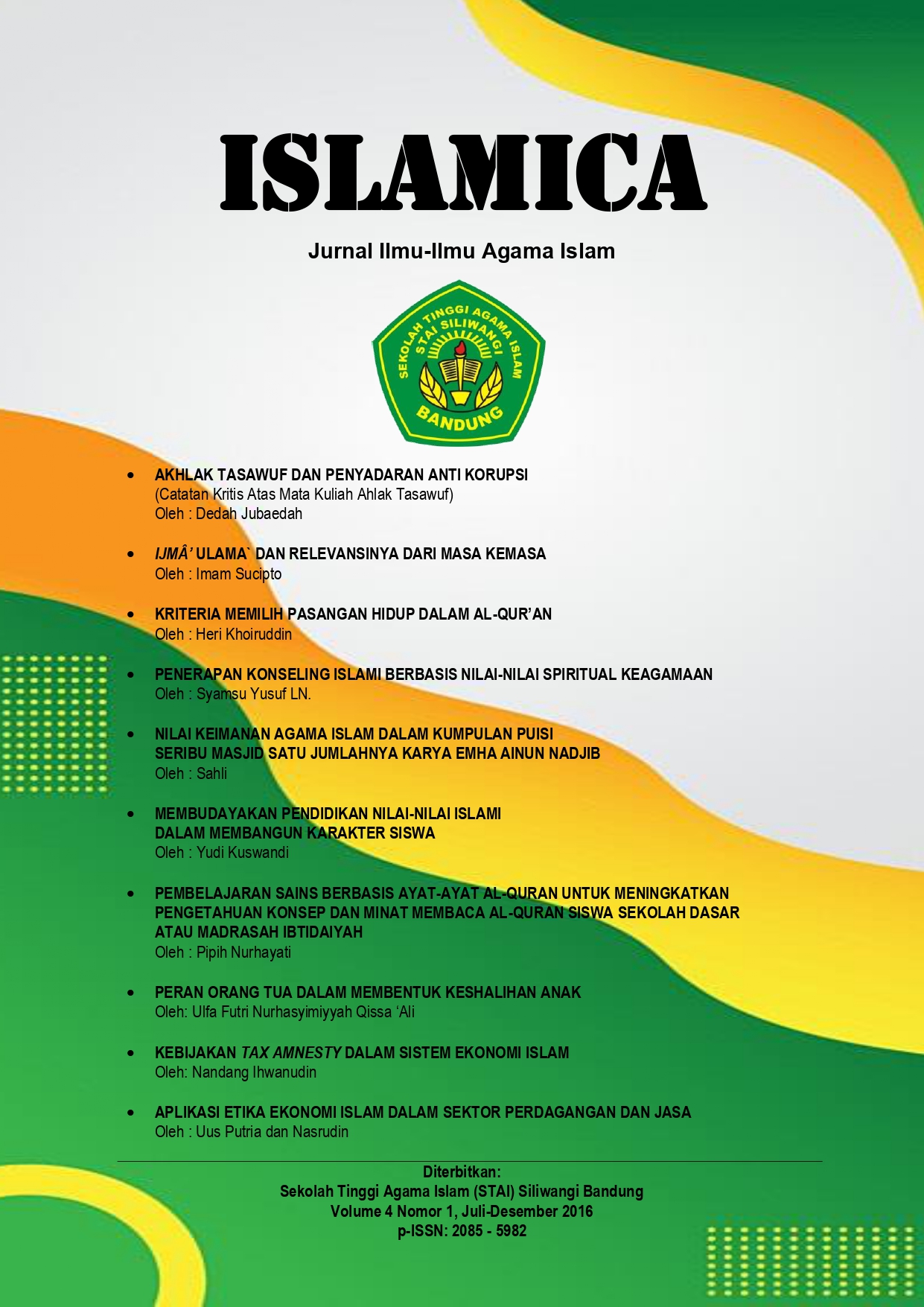Kebijakan Tax Amnesty Dalam Sistem Ekonomi Islam
Kata Kunci:
tax amnesty, islamic economics, state revenueAbstrak
Tax amnesty is the abolition of tax on the taxpayer because it has violated the payment of taxes by paying ransom on the subject of the tax in accordance with the prevailing provisions, thus avoiding administrative sanctions and criminal penalties. As a policy issued in the form of Law Number 11 Year 2016 on Tax Forgiveness, this policy resulted in the pros cons in the community. Even Muhammadiyah plans to submit a judicial review of the Act. This research will discuss more deeply about how tax amnesty policy toward state income and how the Islamic economic system looks at the enactment of tax amnesty policy. In conclusion, the 2016 tax amnesty policy targets the state revenue from this program to reach Rp. 165 trillion, if this is not achieved then the budget deficit will rise and the debt will definitely increase. Therefore, to achieve these targets, required the readiness of the tax apparatus / program. If the target is achieved then macro-economic growth will increase. Furthermore, the tax amnesty policy according to the Islamic view should be seen first about the tax law in Islam itself, when the tax policy is applied as a permissible, the tax amnesty policy can be issued, but the application of tax amnesty seems hard to find in the Islamic economic system, when tax imposition is set as an additional source to cover the shortfall in state spending.
Referensi
Abraham Wirotomo, “Ringkasan Naskah Akademik Tax amnesty”, dalam http://www.kompasiana.com/, diakses tanggal 30 Agustus 2016.
Abraham Wirotomo, “Ringkasan Naskah Akademik Tax amnesty”, dalam http://www.kompasiana.com/, diakses tanggal 30 Agustus 2016.
Brotodihardjo R. Santoso. 2003. Pengantar Ilmu Hukum Pajak. Bandung: Refika Aditama.
Danny Darrussalam, “Tax amnesty Dalam Rangka Rekonsiliasi Nasional (Bagian 1)”, dalam https://www.selasar.com/ekonomi/tax-amnesty-untuk-rekon¬siliasi-nasional, diakses pada 30 Agustus 2016.
Editor, “Abstract”, dalam http://repository.usu.ac.id/bitstream/123456789/29690/ 5/Abstract.pdf, diakses tanggal 30 Agustus 2016.
Editor, “Belajar Pajak”, dalam http://www.pajak.go.id/content/belajar-pajak, diak¬ses pada tangga 30 Agustus 2016.
Editor, “Muhammadiyah Bakal Gugat UU "Tax amnesty" ke MK”, dalam http://nasional.kompas.com/read/2016/08/29/18281651/muhammadiyah.bakal.gugat.uu.tax.amnesty.ke.mk, diakses pada 30 Agustus 2016.
Editor, “Pembinaan Badan Layanan Umum”, dalam http://www.djpbn.kemenkeu. go.id/portal/id/layanan/kantor-pusat/pembinaan-pengelolaan-keuangan-blu.html, diakses tanggal 30 Agustus 2016.
Editor, “Tax amnesty: Mengejar Setoran dari Para Pelanggar Hukum”, dalam https://hizbut-tahrir.or.id/2016/06/23/tax-amnesty-mengejar-setoran-dari-para-pelanggar-hukum/, diakses pada 30 Agustus 2016.
Editor, “Tax amnesty: Mengejar Setoran dari Para Pelanggar Hukum”, dalam https://hizbut-tahrir.or.id/2016/06/23/tax-amnesty-mengejar-setoran-dari-para-pelanggar-hukum/, diakses pada 30 Agustus 2016.
Herman B.Leonard dan Richard Zeckhauser. 1986. Amnesty, Enforcement and Tax Policy. Massachusetts:National Bureau of Econimic Research.
James Alm. 1998. “Tax Policy Analysis: the Introduction of a Russian Tax amnesty”, dalam International Studies Program Working Paper 98-6, Georgia State University Andrew Young School of Policy Studies, 1998.
Jacques Malherbe dkk. 2010. Tax Amnesties in the 2009 Landscape, dalam Bulletin for International Taxation, edisi April 2010.
Katherine Baer dan Eric LeBorgne. 2008. Tax Amnesties: Theory, Trend, and Some Alternatives. Washington: International Monetary Fund.
Kemenkeu, “Wawancara Eklusif Menteri Keuangan Tentang Tax amnesty“, dalam http://www.kemenkeu.go.id/taxamnesty, diakses pada tanggal 30 Agustus 2016.
Mediya Lukman, 2013. Badan Layanan Umum; Dari Birokrasi Menuju Kor¬porasi. Jakarta: Bumi Aksara Publisher.
Ragimun, “Implementasi Pengampunan Pajak di Indonesia”, dalam http://www. kemenkeu.go.id/sites/default/files/Analisis%20Implementasi%20Tax%20Amnesty%20di%20Indonesia.pdf, diakses pada tanggal 30 Agustus 2016.
Republik Indonesia. 2014. Nota Keuangan dan Anggaran Pendapatan dan Belanja Negara Tahun Anggaran 2014. Jakarta: t.pn.
Undang Nomor 11 Tahun 1995 jo, Undang-Undang Nomor 39 Tahun 2007 tentang Cukai.
Undang Nomor 11 Tahun 1995 jo, Undang-Undang Nomor 39 Tahun 2007 tentang Cukai.
Undang-Undang Nomor 11 Tahun 2016 tentang Pengampunan Pajak.
Undang-Undang Nomor 20 Tahun 2000 tentang BPHTB
Undang-Undang Nomor 6 Tahun 1983 jo, Undang-Undang Nomor 9 Tahun 1994 jo, Undang-Undang Nomor 16 Tahun 2000 jo, Undang-Undang Nomor 28 Tahun 2007 tentang Ketentuan Umum dan Tata Cara Perpajakan.
Waluyo. 2011. Perpajakan di Indonesia. Jakarta: Salemba Empat.
Ichsan Nafarin, “Kepabean dalam Perspektif Syariah”, dalam http://www.bppk. kemenkeu.go.id/publikasi/artikel, diakses pada 30 Agustus 2016.
Unduhan
Diterbitkan
Cara Mengutip
Terbitan
Bagian
Lisensi
Hak Cipta (c) 2016 Nandang Ihwanudin

Artikel ini berlisensiCreative Commons Attribution-ShareAlike 4.0 International License.


